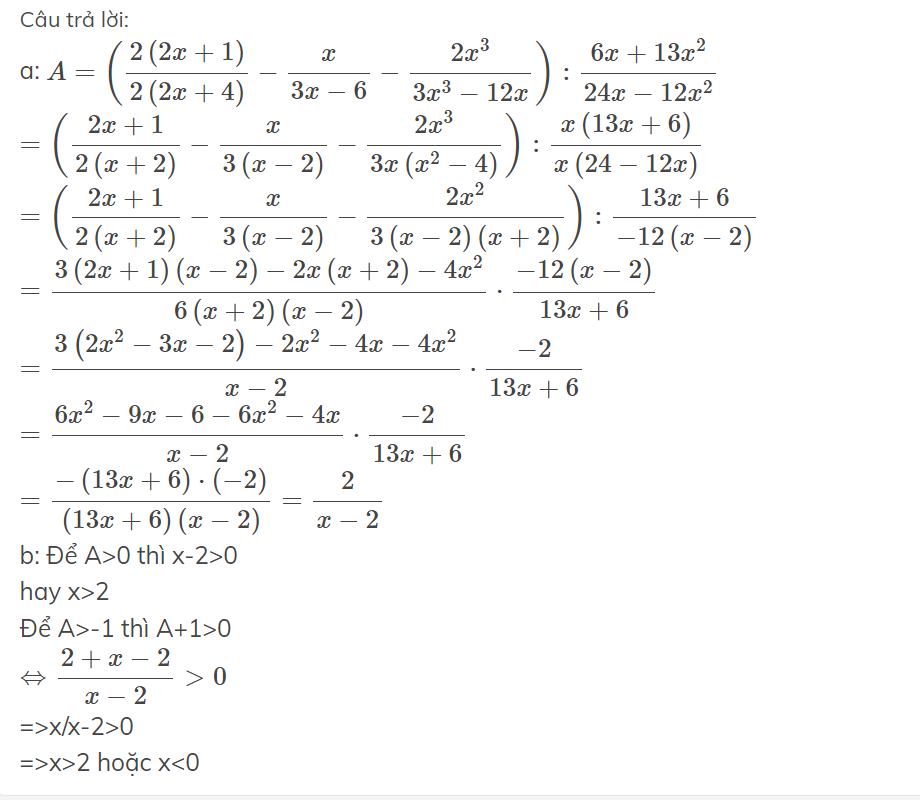Hãy nhập câu hỏi của bạn vào đây, nếu là tài khoản VIP, bạn sẽ được ưu tiên trả lời.

\(a,\)
\(A=\left(\frac{4x}{x+2}-\frac{x^3-8}{x^3+8}.\frac{4x^2-4x+16}{x^2-4}\right):\frac{16}{x+2}.\frac{x^2+3x+2}{x^2+x+1}\)\(ĐKXĐ:x\ne\pm2\)
\(A=[\frac{4x}{x+2}-\frac{\left(x-2\right)\left(x^2+2x+4\right).4\left(x^2-2x+4\right)}{\left(x+2\right)\left(x^2-2x+4\right)\left(x-2\right)\left(x+2\right)}]:\frac{16}{x+2}.\frac{\left(x+1\right)\left(x+2\right)}{x^2+x+1}\)
\(A=[\frac{4x}{x+2}-\frac{4\left(x^2+2x+4\right)}{\left(x+2\right)^2}].\frac{x+2}{16}.\frac{\left(x+1\right)\left(x+2\right)}{x^2+x+1}\)
\(A=\frac{4x^2+8x-4x^2-8x-16}{\left(x+2\right)^2}.\frac{x+2}{16}.\frac{\left(x+1\right)\left(x+2\right)}{x^2+x+1}\)
\(A=\frac{16\left(x+2\right)}{\left(x+2\right)^2.16}.\frac{\left(x+1\right)\left(x+2\right)}{x^2+x+1}\)
\(A=\frac{-\left(x+1\right)}{x^2+x+1}\)
\(B=\frac{x^2+x-2}{x^3-1}\)\(ĐKXĐ:x\ne1\)
\(B=\frac{\left(x+2\right)\left(x-1\right)}{\left(x-1\right)\left(x^2+x+1\right)}\)
\(B=\frac{x+2}{x^2+x+1}\)
\(b,\)
Ta có:
\(A+B=\frac{-\left(x+1\right)}{x^2+x+1}+\frac{x+2}{x^2+x+1}\)
\(=\frac{-x-1+x+2}{x^2+x+1}\)
\(=\frac{1}{x^2+x+1}\)
\(\Rightarrow A+B=\frac{1}{x^2+x+1}=\frac{1}{x^2+2.x.\left(\frac{1}{2}\right)^2+\frac{3}{4}}=\frac{1}{\left(x+\frac{1}{2}\right)^2}+\frac{3}{4}\)
Vì:\(\left(x+\frac{1}{2}\right)^2\ge0\forall x\)
\(\Rightarrow\left(x+\frac{1}{2}\right)^2+\frac{3}{4}\ge\frac{3}{4}\forall x\)
\(\Rightarrow\frac{1}{\left(x+\frac{1}{2}\right)^2+\frac{3}{4}}\le\frac{1}{\frac{3}{4}}\)
\(\Rightarrow A+B\le\frac{4}{3}\)
\(\Rightarrow GTLN\)của \(A+B=\frac{4}{3}\Leftrightarrow x+\frac{1}{2}=0\)
\(\Leftrightarrow x=\frac{-1}{2}\left(TMĐK\right)\)
Vậy........

\(P=\frac{x\left(x+5\right)+y\left(y+5\right)+2\left(xy-3\right)}{x\left(x+6\right)+y\left(y+6\right)+2xy}\)
\(=\frac{x^2+5x+y^2+5y+2xy-6}{x^2+6x+y^2+6y+2xy}\)
\(=\frac{\left(x+y\right)^2+5\left(x+y\right)-6}{\left(x+y\right)^2+6\left(x+y\right)}\)
\(=\frac{\left(x+y\right)\left(x+y+5\right)-6}{\left(x+y\right)\left(x+y+6\right)}\)
\(=\frac{2005\times\left(2005+5\right)-6}{2005\times\left(2005+6\right)}\)
\(=\frac{2005\times2010-6}{2005\times2011}\)
\(=\frac{2004}{2005}\)

1.\(A=\frac{2x^2-16x+41}{x^2-8x+22}\) \(=\frac{2\left(x^2-8x+22\right)-3}{x^2-8x+22}=2-\frac{3}{\left(x-4\right)^2+6}\ge\frac{1}{2}\)
Dấu '' = '' xảy ra khi x = 4.
Vậy MinA= \(\frac{1}{2}\) tại x = 4.
